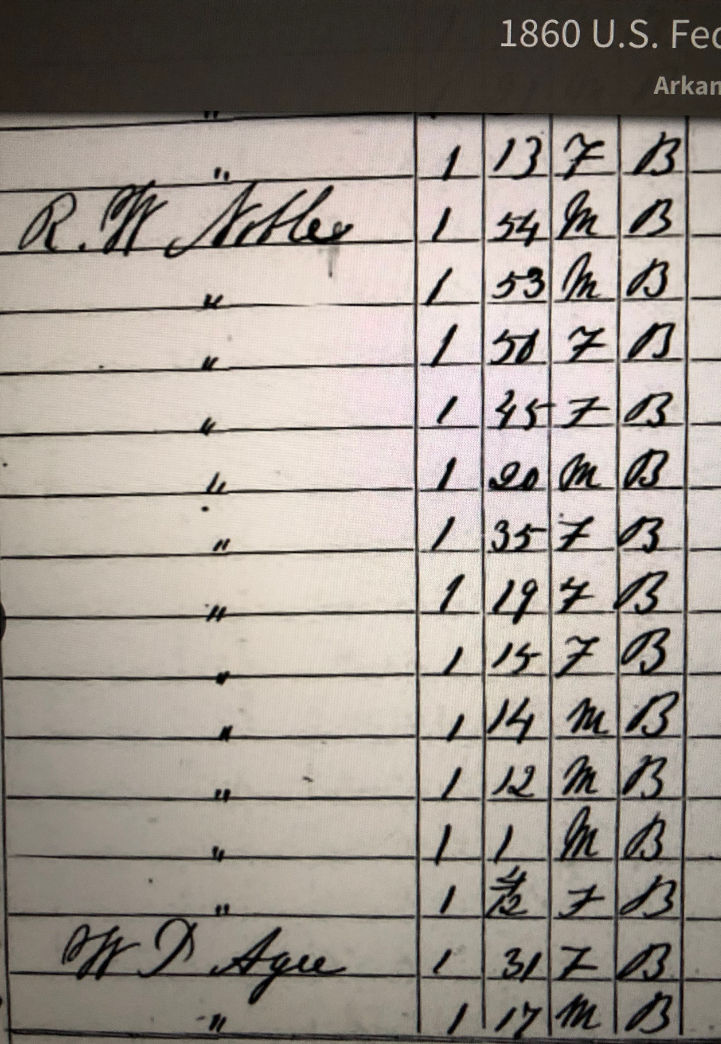Meeting a Descendent of My Ancestor's Enslaved People
- Tom Noble

- Nov 25, 2024
- 3 min read

I was traveling home from Houston after a day of meetings, and I was scheduled on one of the last Southwest flights out of Houston’s Hobby Airport that night. The terminal was mostly empty, and there was no line queued up for security. With time to spare I was in no hurry as I handed the TSA agent my boarding pass and drivers license. After glancing at my license she looked up at me, and with a slight smile told me that her grandmother’s name was also Noble. With no one waiting behind me, I reflexively responded with a smile and asked where she was from – something I had done a dozen times before in other situations. She responded that her grandmother had grown up in Arkansas.
I wasn’t thinking so much about my flight now, as our conversation became more than a passing courtesy. I told her that my family was from Arkansas – south Arkansas, around Hamburg. She connected the final dot, saying that her grandmother’s family was also from that area of Ashley County. I think I probably stood looking at her for a few seconds as it sunk in. The TSA agent was black. I am white. I am also pretty good with history, including my family’s. I knew that in April 1865, when Robert E. Lee surrendered to Grant at Appomattox Courthouse in Virginia, that my grandfather’s grandfather was living on the family farm back in Ashley County, Arkansas, and at age 15 was helping his father, Robert Weekley Noble, oversee the farm and its 12 slaves. Seven brothers and cousins had gone to war three years earlier to protect their right to continue enslaving six men and boys – aged 3, 14, 16, 22, 55 and 56 – and six women and girls – aged 2, 17, 21, 37, 47 and 52. Slaves usually did not have surnames until required to after emancipation, when many of them simply adopted the name of their former master. It was very likely that the TSA agent’s and my great great grandparents had lived on the same farm, one enslaved by the other. I can find my ancestor’s names and significant life events. Hers are nameless – age and gender were all that mattered.
This right, sanctioned by Supreme Court Decisions, was believed by them to be benevolent since the slaves, who were their legal property, had no legal standing as people and, seen as unequal in their humanity, were believed by the South to be better off enslaved than left on their own. What had finally brought the situation to war was that the slave states saw the North, led by a hostile political party and moralizing abolitionists as threatening to destroy their way of life and economic equality with the North by threatening to overturn their legal right to control their own property - slaves. But they weren't property, they were people. Enslaved people subjugated through tyranny, the threat and reality of physical beatings, rape and death. Children were sometimes separated from their parents. Too often, the fathers were the white overlords.
That chance meeting at Hobby Airport ten years ago has stayed with me. I wish my ancestors – my family – had fought as abolitionists, but they didn’t. However, God can work all things for good, and so not long afterwards it hit me – a lesson learned about coming down on the wrong side of God and history, about sacrificing others for our self-indulgence, and justifying it through law and the diminution of the other’s humanity.
I want to think that if I had lived in 1861, I would have stood with those opposing the legally sanctioned right to choose slavery, but God didn’t put me in that situation. In His providence He put me here, now. I wish my ancestors – my family – had fought as abolitionists, but they didn’t. I wish they hadn't been part of the Jim Crow South, but they were. So what about me. Where do I stand today, on today's issues, the issues that God has providentially positioned me to encounter. One of the deep convictions that is emerging within me is that Christ looked past the issues of his day and focused instead on the hearts of people. I'm beginning to believe that is what God expects from me. To love the people behind the issues - to appeal to their hearts for the greater prize - to "love your neighbor as yourself." I'm working on it.
Tom Noble, December 9, 2019




Comments